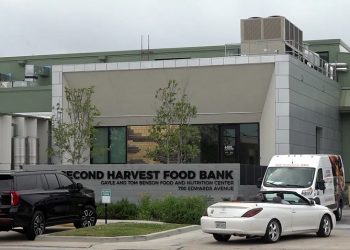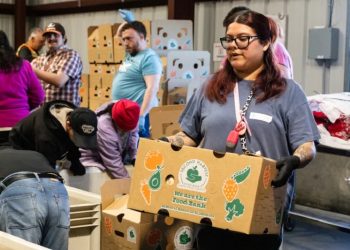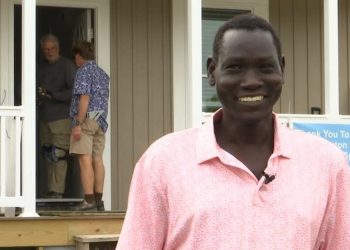KNOXVILLE, Tenn. — A group of four students at the University of Tennessee has turned a simple class project into a heartfelt mission to support local children in need. Luke McCrossin, Maeve Miller, Cecilia Fermann, and Jackson Martin are working together to raise $1,500 for the Food for Kids program at Second Harvest Food Bank of East Tennessee, a cause they became passionate about after learning about the program’s impact on the local community.
The Food for Kids program serves over 15,000 students across 18 counties in East Tennessee, providing essential weekend meals for children who may not have enough food at home. McCrossin, who initially took on the fundraiser as part of an English class assignment, explained that the project quickly evolved into a personal commitment to helping others.
“We saw that they had a program going on underneath it which raises money to provide food bags for kids in need in the local area, so we decided to help with that,” McCrossin said.
Miller echoed his sentiment, adding, “Currently, we are raising money for Second Harvest specifically for their Food for Kids Program, which focuses on helping kids who might not have parent support at home, so they have access to food when they’re not at school.”
As of Wednesday afternoon, the group had raised over $1,200 through a GoFundMe campaign. The funds will go directly to helping provide meals for children who would otherwise go hungry over the weekend. McCrossin shared that the amount raised so far would feed 12 children for an entire year. “It’s good to help out the community,” he said.
However, the timing of their efforts is particularly significant, as Second Harvest Food Bank is facing a shortage of food due to federal funding cuts. The USDA recently reduced food allocations, leading to a 43% decrease in the food bank’s supply. Last month, 21 truckloads of USDA food were canceled, leaving the food bank with empty shelves.
Director Elaine Streno of Second Harvest explained the difficulty of managing the growing need for food amid these financial and logistical challenges. “The demand for food has risen about 20% in the last couple of years. The cost of food, all of the entities that are going into when we go to the grocery store—our clients are feeling it,” Streno said in an interview on April 17.
Despite the cuts and increased demand, McCrossin and his classmates remain determined to support the food bank and its mission. “They seem very grateful for it, obviously, and we are happy to help out with that,” McCrossin said.
For those interested in supporting the cause, the students’ GoFundMe campaign is still active, and donations are crucial in helping Second Harvest continue its vital work in the community.
As these students show, even small efforts can lead to meaningful change in the lives of those who need it most.













